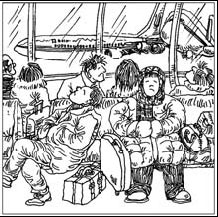What is wrong with our cities? During the snowy week that many of them just experienced, reports surfaced about surprising hazards and nuisances in cities that, not long ago, claimed to have some of the world's strongest urban economies.

Wuhan, unmistakably the largest city in Central China - with glittering commercial areas and more than 10,000 yuan-per-square-meter luxury housing estates on its beautiful lakes - was hit by the worst snow storm in the past years. As the snow fell, the city's water system broke down, raising alarms of shortages that affected as many as 100,000 residents.
In Hefei, the snow caved in the roofs of key facilities in a newly developed industrial area, one supposedly outfitted with cutting edge equipment to suit the needs of outside investors. Not far from the city, a power transmission line was cut when it fell to the ground.
Worse still, many flights and highway transport services were either delayed or cancelled, leaving millions of passengers queuing in the snow as they waited to get tickets to return home before the coming Spring Festival holiday.
In Henan province, most expressways were placed under "traffic control", a Chinese euphemism meaning temporarily shut down.
In the city of Guangzhou alone, China Southern Airlines reportedly booked 2,200 hotel beds to accommodate passengers whose flights had been delayed.
Perhaps the worst thing was that as of yesterday morning, there were still no clear figures about delays and cancellations, or how many people were affected.
Think of it: How would those people who have delivered boastful televised sermons about China's imminent rise as a big power explain to their audience how a snow storm could interrupt life to such an extent that for a moment things looked "beyond being numerically manageable", as some historians used to describe the situation during the days of empire?
If the worst snow of the past eight years, or even the past 20 years, can cause so much trouble for what is probably the second largest economy in the world, what will China do in the face of climate change and rising sea levels?
And even if climate change were a remote threat - as some people seem to think, though I do not agree with them - how would China react to the worldwide economic slowdown, if not outright turmoil, that looks unavoidable this year?
Analysts still do not see an end to the US' financial woes. And many small companies in Chinese coastal regions, which used to rely entirely on exports for survival, are folding. The situation facing the Chinese economy may be a worst-in-a-decade situation, if not more serious. There should be more open discussion about the contingency plans.

There is also a good example to follow. The Ministry of Railways (MOR) was quick in introducing its holiday season contingency program almost a week earlier than originally planned, partly because the snow had inspired more passengers to choose dependable rail transport.
On January 18, the day the contingency program took effect, the MOR accommodated as many as 4.3 million passengers, even though there were still people who failed to get the tickets they were waiting for.
The Chinese railway system is clearly a powerhouse when it comes to setting records. So it is a good thing that the MOR officials do not seem to have the habit of bragging about being the bosses of the world's No 1 rail power. They just do their work.
E-mail: younuo@chinadaily.com.cn
(China Daily 01/21/2008 page4)

